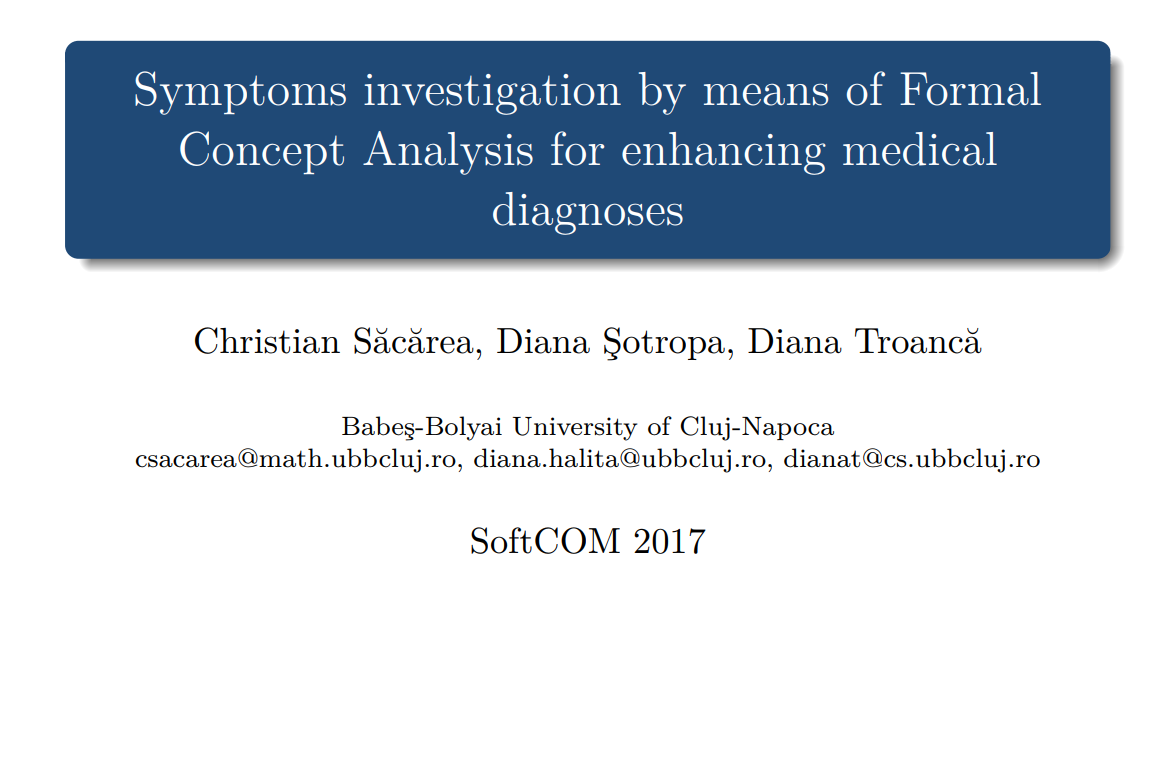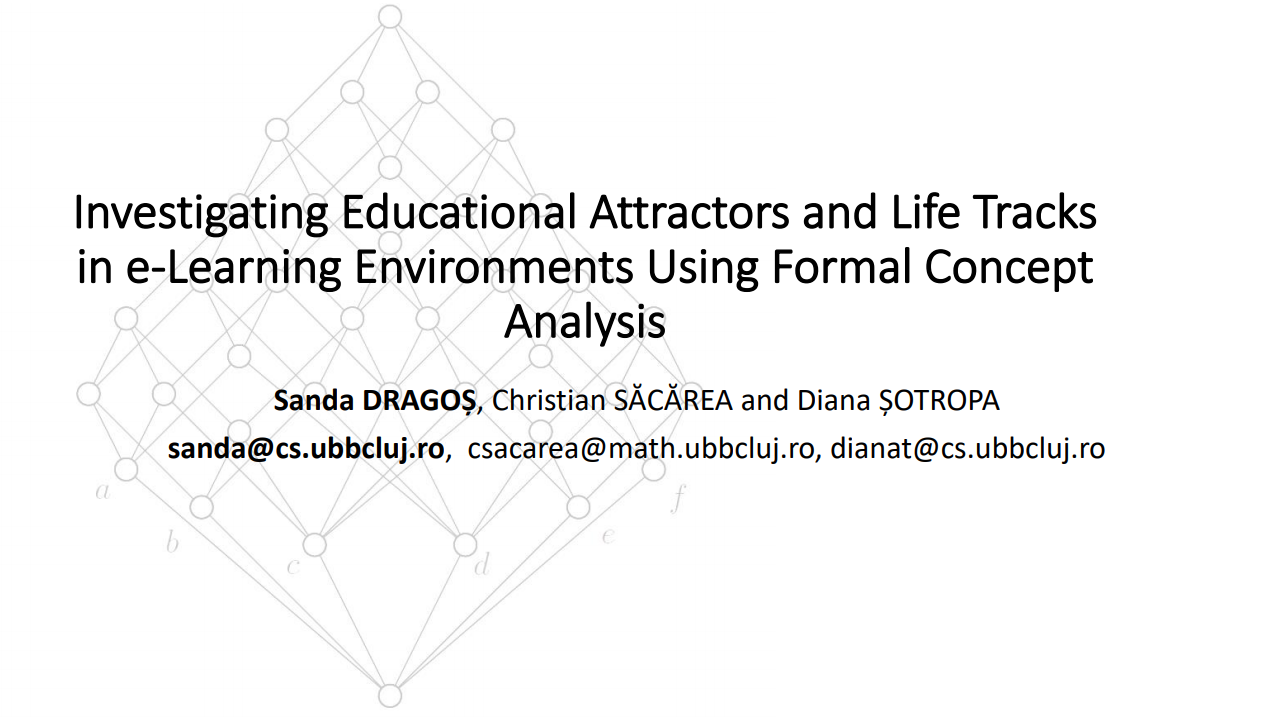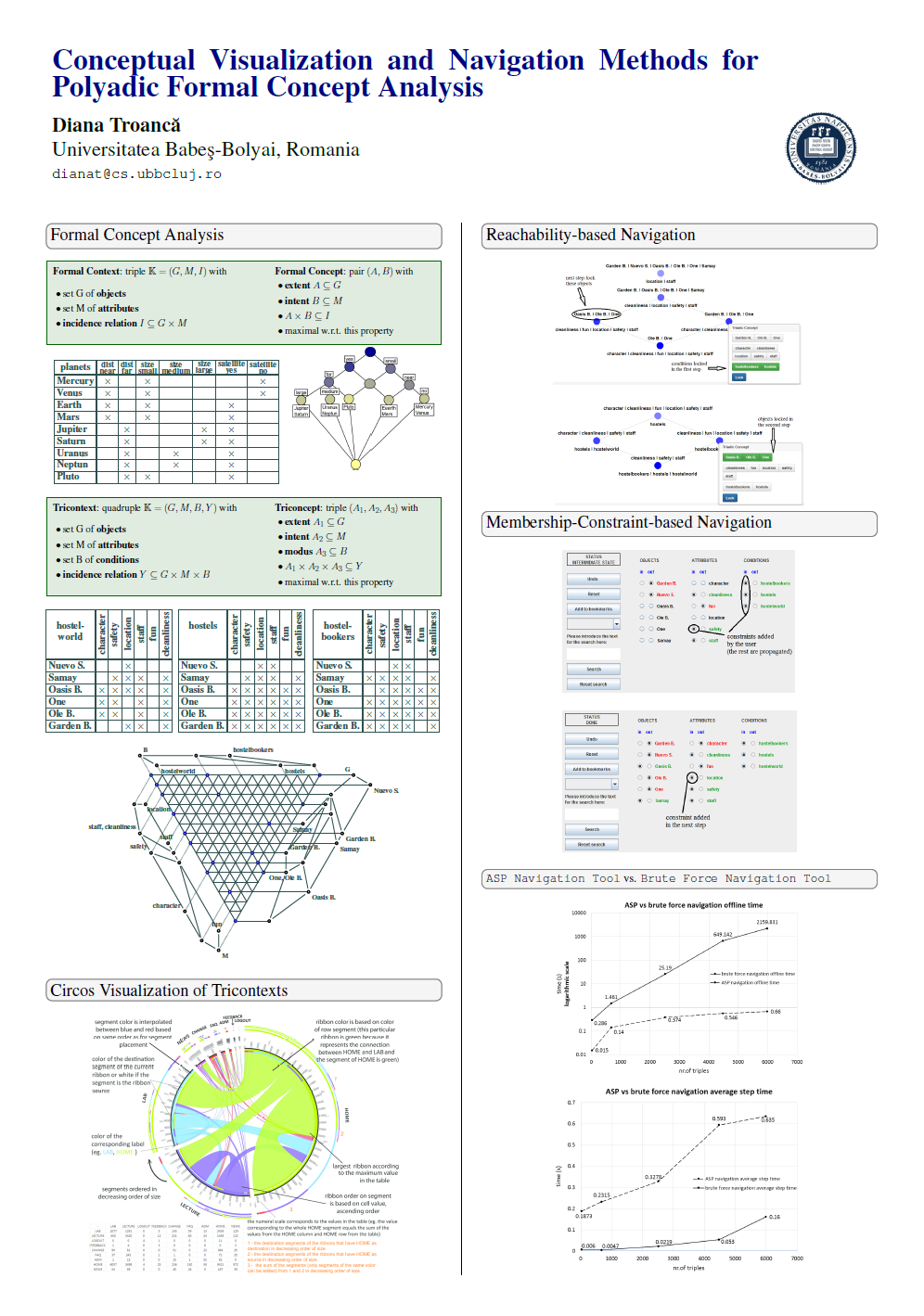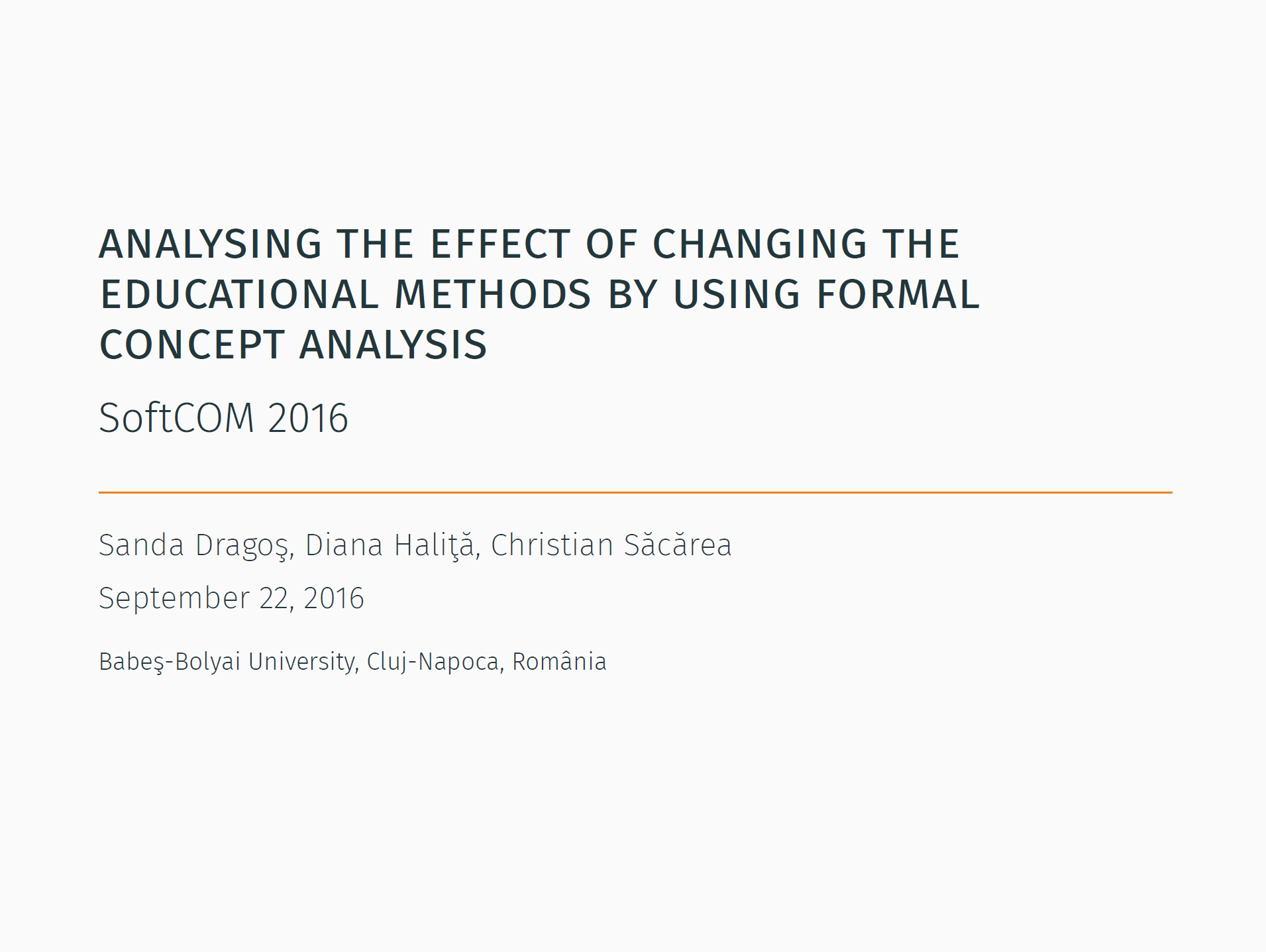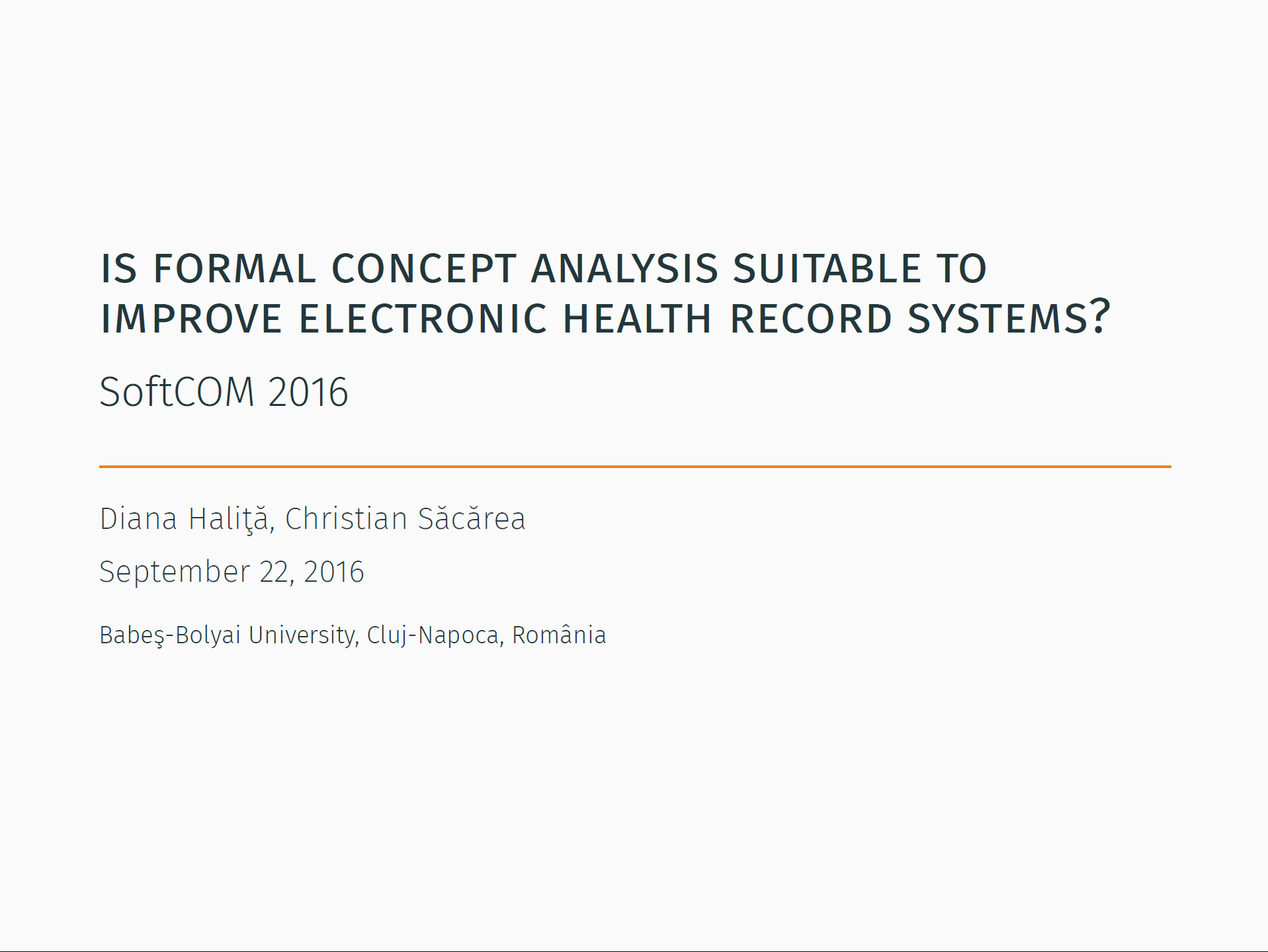Abstract:
Pattern extraction is one of the major topics in Knowledge Discovery. Out of numerous data mining techniques we propose to use a new approach: Formal Concept Analysis (FCA) together with Graph Databases with the implementation Neo4j. FCA is a prominent field of applied mathematics using maximal clusters of object-attribute relationships to discover and represent knowledge structures. The use of FCA gained much importance in many research domains in recent years. Despite the similarity of the graph representation between FCA and Neo4j, the structure and relations among the elements are represented differently and can offer a different perspective on the analysis.
This paper gives more insight into how patterns can be extracted from medical data and interpreted by means of FCA and Neo4j in order to help medical staff improve the accuracy of diagnoses. We examine the factors related to patients' symptoms and diagnostics and then compare the results with the ones provided by a medical care center.
We apply knowledge discovery techniques and conceptual landscapes paradigm in order to obtain an in-depth and high qualitative knowledge representation of medical data.
By making use of the effectiveness and the graphical representation of conceptual hierarchies we extract valuable knowledge from medical data sets through which we solve the knowledge discovery, processing and representation task in Electronic Health Record systems.
Keywords:
Formal Concept Analysis, Electronic Health Record, medical data, many-valued contexts, conceptual scaling, Triadic FCA, Neo4J
Investigating Educational Attractors and Life Tracks in e-Learning Environments Using Formal Concept Analysis
Abstract:
E-learning platforms are widely used in modern education. While in the traditional education the instructor does not have a comprehensive insight on how his students are using the educational resources, the situation is different for online learning environments. Web usage logs comprise a variety of information regarding the visited pages. These web-logs become a rich resource for data analysis. Understanding usage patterns from web-logs is widely used in order to improve web-based applications. In our research we are interested in distilling valuable knowledge on users behavior in online educational platforms using the knowledge discovery and processing methods of Formal Concept Analysis (FCA). This knowledge can then be used to understand how students are using the educational resources, to gain insight on their online behavior as well as how they use these resources over time. In this paper, we focus on the detection of behavioral patterns in web-based e-learning environments and on how users adhere to intended educational attractors. For this, we first use FCA to investigate so-called educational attractors and then distill users life tracks using Temporal Concept Analysis. We exemplify the developed methods on a locally developed e-learning platform called PULSE.
Keywords:
Life tracks, Temporal Concept Analysis, Web logs analysis, Conceptual structures, User behavior, Attractors
Navigation and Exploration Tool for Polyadic FCA
Abstract:
Formal concept analysis (FCA) is a powerful mathematical tool that allows deriving concept hierarchies from large sets of data in order to analyze data and derive meaningful information from it [3]. FCA finds practical application in fields including data mining, text mining, machine learning, knowledge management, semantic web, software development, chemistry, biology and many more. FCA works with contexts and concept lattices derived from them. Since navigation in three-dimensional spaces is rather difficult, one method of navigation in
tricontexts uses local projections and reduces the triadic contexts to multiple dyadic contexts. The purpose of this paper is to present FCA Tools Bundle, which is a collection of tools for dyadic and triadic formal concept analysis. Furthermore, in this paper, we describe the architecture of the tool and the technologies used in its implementation.
Keywords:
FCA, Triadic Context, Navigation Tool, Concept Lattice
FACT – A Tool for Temporal Formal Concept Analysis
Abstract:
Formal Concept Analysis offers an elegant, intuitive and powerful graphical representation of landscapes of knowledge as concept lattices.
In this paper, we report about the current state of FACT, a tool for temporal data analysis and knowledge discovery. FACT is a web-based application which allows an online interaction with larger data sets in order to explore and analyze data conceptually. It uses concept lattices in order to extract knowledge from the data set. After presenting the tool itself we shortly describe an example and present the planning for further development.
Keywords:
Life tracks, Temporal Concept Analysis, Web logs analysis, Conceptual structures, User behavior, Attractors
An investigation of user behavior in educational platforms using Temporal Concept Analysis
Abstract:
In this paper, we focus on the problem of investigating user behavior using conceptual structures distilled from weblogs of an educational e-platform. We define a set of so-called attractors as sets of scales in conceptual time systems and compute user life tracks in order to highlight different types of behaviors. These life tracks can give valuable feedback to the instructor how his students are using the online educational resources, analyzing their behavior and extracting as much knowledge as possible from the log access files. This might also be helpful to analyze the usability of the online educational content, eventually for improving the structure of the platform and to develop new educational instruments.
Keywords:
Life tracks, Temporal Concept Analysis, Web logs analysis, Conceptual structures, User behavior, Attractors
A FCA Strategy for Improving Web-Based Learning Sites
Abstract:
Nowadays, online educational systems show a rapid development due to the growth of the Internet, which offer unique opportunities to improve them based on users’ experiences. This paper presents advances of a Formal Concept Analysis (FCA) based strategy for improving web-based learning sites. We have used together Web Usage Mining and Formal Concept Analysis techniques in order to create a visual overview of exploring web-logs and discover knowledge in web logs. We have focused
on visualizing triadic data in order to emphasize user dynamics through the educational systems. Switching from a triadic to a polyadic perspective we have detected repetitive browsing habits. From all the revealed behaviors we distill then users life tracks by using Temporal Concept Analysis.
Keywords:
Web usage mining, Life track, Behavioral patterns, Online e-learning environment, Temporal Concept Analysis, Formal Concept Analysis, Triadic Formal
Concept Analysis.
Conceptual Visualization and Navigation Methods for Polyadic Formal Concept Analysis
Abstract:
Conceptual knowledge is closely related to a deeper understanding of existing facts and relationships, but also to the argumentation and communication of why something happens in a particular way. Formal Concept Analysis (FCA) is the core of Conceptual Knowledge Processing. It emerged from applied mathematics and quickly developed into a powerful framework for knowledge representation. It is based on a set theoretical semantics and provides a rich amount of mathematical instruments for representation, acquiring, retrieval, discovery and further processing of knowledge. FCA was introduced in the dyadic setting [Ganter and Wille, 1999] and extended to a triadic [Lehmann and Wille, 1995] and eventually n-adic setting [Voutsadakis, 2002]. Intuitively, dyadic datasets can be understood as objects related to attributes and, in addition, to conditions for the triadic case. FCA defines concepts as maximal clusters of data in which all elements are mutually interrelated. A common problem for n-adic FCA is concept visualization and navigation. The goal of my thesis is to find visualization and navigation paradigms that can be applied to higher-dimensional datasets. Therefore, we study the triadic case and propose several visualization and navigational approaches. Furthermore, we evaluate these approaches, study their generalizations and extend them, where possible, to n-ary formal contexts.
Keywords:
Conceptual Knowledge Processing, Formal Concept Analysis, visualization, navigation, higher-dimensional datasets
FCA Tools Bundle – a Tool that Enables Dyadic and Triadic Conceptual Navigation
Abstract:
Formal Concept Analysis is a prominent field of applied mathematics handling collections of knowledge - formal concepts - which are derived from some basic data types, called formal contexts by using concept forming operators. One of the strengths of FCA is the elegant, intuitive and powerful graphical representation of landscapes of knowledge as concept lattices. Nevertheless, in case of triadic FCA (3FCA) for more than 20 years there was no automatic tool for graphical representation of triconcept sets. Moreover, the triangular representation of trilattices, used so far in 3FCA has several disadvantages. Besides the lack of clarity in representation, one major disadvantage is that not every trilattice has a triangular diagram representation. In this paper we focus on the problem of locally navigating in triconcept sets and propose a tool which implements this navigation paradigm. To the best of our knowledge this is the first tool which makes navigation in larger triconcepts sets possible, by flipping through a certain collection of concept lattices.
Keywords:
FCA, Formal Concept Analysis, Context, Concepts, Dyadic Context, Triadic Context, Concept Finder, FCA Tools Bundle, Tools
Analysing the Effect of Changing the Educational Methods by Using FCA
Abstract:
Formal Concept Analysis (FCA) developed in the last 30 years to a prominent field of Knowledge Discovery, Processing and Representation. Well-known for its intuitive representation of conceptual structures as order diagrams, FCA handles conceptual hierarchies which can be derived from various data sets. This makes FCA suitable for knowledge management tasks in many fields. We consider the problem of using FCA as a quality of education evaluation tool for the instructor. Students are using educational resources in an e-learning platform and the raw data set consists only of the subsequent recorded weblogs. After a preprocessing stage, various conceptual structures - among them behavioral patterns of e-learning resources usage - are distilled from the dataset using conceptual scaling and triadic FCA and are altogether offered as a decision support for the instructor. We prove the efficiency of using FCA in comparing students behavior through the educational process and highlight how new educational strategies correlate with their academic performance and the use of online learning ressources.
Keywords:
Formal Concept Analysis, Knowledge Discovery, e-learning platform, triadic FCA, educational process
Is FCA suitable to improve Electronic Health Record Systems?
Abstract:
Formal Concept Analysis (FCA) is a prominent field of applied mathematics using formal concepts - maximal clusters of object-attribute relationships - to discover, process, and represent knowledge in so-called conceptual hierarchies. Its efficient algorithms and expressive power makes FCA suitable to unify methodologies and to provide an in-depth insight on knowledge structures [1], [2]. Electronic Health Record (EHR) systems are nowadays widespread and used in different scenarios. In this paper we consider the problem of improving EHR systems with new, FCA grounded features. For this, we start with some particular medical data sets and discuss the improvement of some features of EHR systems by using FCA. Two main methods have been taken into consideration so far. First, we consider the medical data sets as many-valued contexts. By using conceptual scaling, we build `knowledge landscapes' [3] and show how these `landscapes' might be used in the framework of EHR. A complementary approach is based on Triadic FCA (3FCA) approach. We exemplify these methods on several medical datasets and discuss how conceptual landscapes can be used to improve not only the integrated view of patient data (as an EHR system specific feature), but also communication and support future research.
Keywords:
Formal Concept Analysis, Electronic Health Record, medical data, many-valued contexts, conceptual scaling, Triadic FCA

